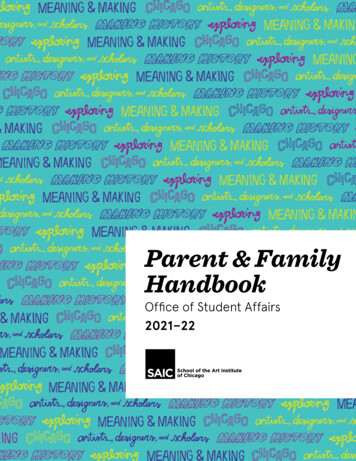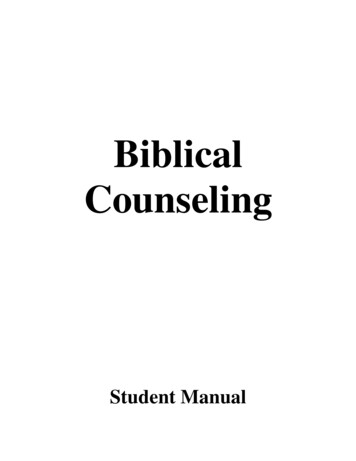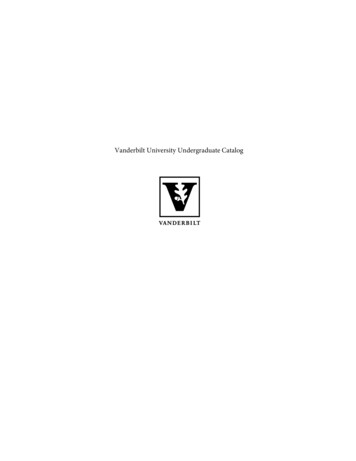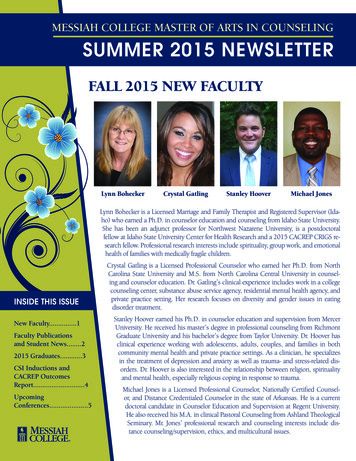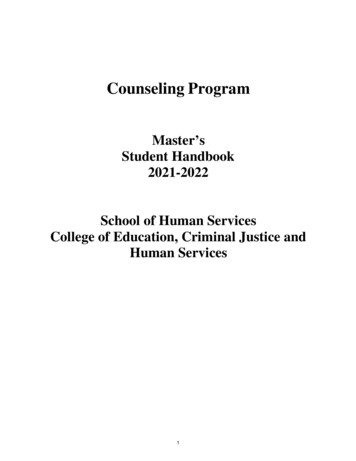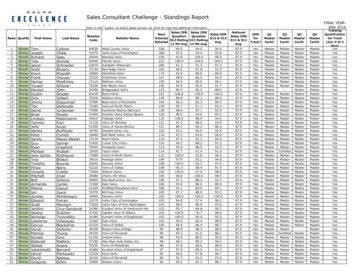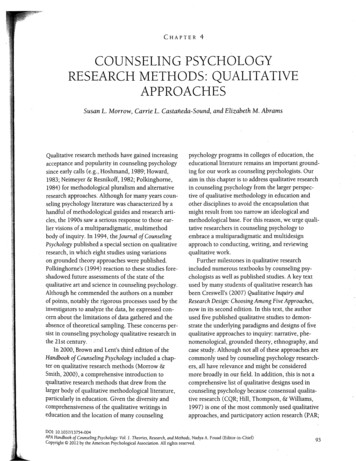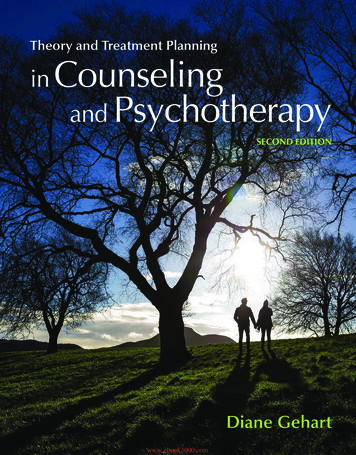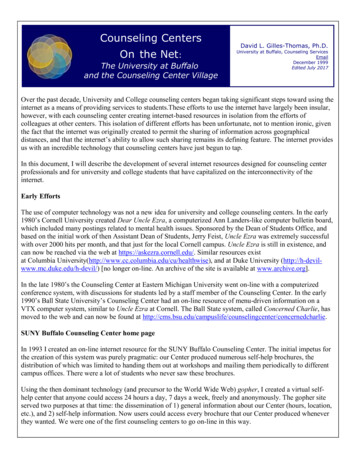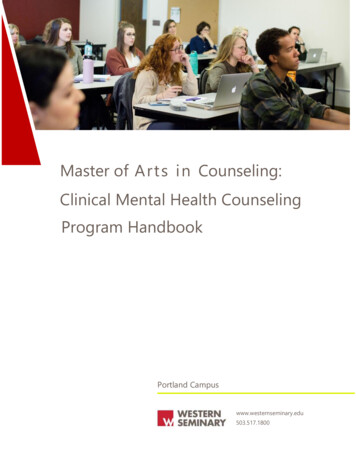
Transcription
Master of Arts i n Counseling:Clinical Mental Health CounselingProgram HandbookPortland Campuswww.westernseminary.edu503.517.1800
Welcome!Welcome to the M.A. Counseling Program at Western Seminary’s Portland campus. We are excited to join you on your educationaljourney. The Western Seminary clinical mental health counseling program endeavors to prepare practitioners of personal integritywho will provide effective, ethical, culturally inclusive, professional counseling from a Christian worldview. Our desire is to create afocused but flexible learning environment in which you will have the opportunity to grow personally, spiritually, and professionally.We would like to assist you in having a successful academic journey and hope that you have fun while learning. This handbook is provided to inform you of program policies and procedures, to answer routine questions concerning theprogram, and to guide you to completion of your degree. Please keep it on hand for ready reference. You are responsible toknow the contents of the handbook and to make use of the attached forms. While every effort is made to ensure the accuracy of the information in this Handbook, Western Seminary has the right tomake changes at any time without prior notice. The Handbook is for the purpose of providing information, and does not constitute irrevocable terms of contract between theSeminary and current or prospective students. There are established procedures for making changes; procedures whichprotect the Seminary’s integrity and the individual student’s interest and welfare. A curriculum or graduation requirement,when altered, generally is not made retroactive unless the alteration is to meet counseling licensure requirements or is to thestudent’s advantage and can be accommodated within the span of years normally required for graduation. Students are advised to carefully read the Seminary Catalog, available at New Student Orientation or through the Registrar’sOffice. Further, the M.A. Counseling Handbook provides specific and detailed information as a supplement to the Catalog.Details on specific course offerings and class times are published in the Course Schedule, available in advance of eachsemester from the Registrar’s Office and on the school website. Information on current fees and financial policies isavailable from the Business Office. Upon admission, students are assigned a faculty advisor with whom the student mayconsult for course planning and additional information and assistance.On Form CNF035, you will find the program checklist. It is provided as a convenient record of your progress in the program and as away to see the program at a glance. Other forms that you will need throughout the course of your studies are found in the CounselingForms section on the counseling program website.2
In addition to the materials in this handbook, we (faculty and staff) are available to provide personal guidance and response s to yourquestions. If you have further questions, please do not hesitate to call us at the main seminary number (503) 517-1800, or at thecounseling program (503) 517-1976. From out of town, call 1-877-517-1800.Hannah Acquaye, Ph.D.Associate Professor of CounselingEmail: hacquaye@westernseminary.eduRachel Heffield, Ph.D. LPC #C6262Assistant Professor of CounselingCounseling Program DirectorEmail: rheffield@westernseminary.eduKara Johansen, Psy.D. #3190Child & Youth Emphasis CoordinatorEmail: kjohansen@westernseminary.eduBeth Peterson, Ph.D. LPC #C6541Assistant Professor of CounselingEmail: bpeterson@westernseminary.eduNorm L. Thiesen, Ph.D. LPC #C1704Professor of Pastoral CounselingEmail: nthiesen@westernseminary.eduBryan Warren, Ph.D. LPC #C4256Assistant Professor of CounselingEmail: bwarren@westernseminary.eduKendra Huntington, B.A.Executive Administrative Assistant for Counseling and AcademicsEmail: khuntington@westernseminary.eduWhile every effort has been made to ensure the accuracy of this handbook, we reserve the right to make changes at any time without prior notice. Revised January 2022.3
Table of ContentsQUESTIONS EVERYONE ASKS . 4PROGRAM DESCRIPTION – Page 5Overview. 5Admission Requirements . . 6Degree Requirements . 7Basic Curriculum . 8Program Schedules . 11Program Checklists . 11Training and Licensing Sequence . 12About the National Counselor Exam (NCE) . 13POLICIES AND PROCEDURES – Page 15Course Load . . .15Code of Ethics . 16Grading .17Attendance Policy . 18Writing Guidelines . 18Professional Assessment of Candidates (PAC) . 19Time Limits of Program . 23Evaluation Procedures . 23Graduation Requirements . . 24INTERNSHIP – Page 26Sequence. 26Intern Role. 26Summary of Internship Procedure . 27Insurance Options and Requirements . 28SPECIAL GUIDELINES – Page 29Endorsement Policy . 29Post-graduate License and Certification . . 29Internship Hours . 30Guidelines for Post-Degree Supervision . . 31FACTS OF INTEREST – Page 32Counseling Services . 32Financial Assistance . 32Professional Organizations . 32COMPREHENSIVE CLINICAL INTEGRATIVE PAPER – Page 34APA Writing Style . 394
Questions Everyone AsksLook for the answers to these questions on the pages listed belowWhat makes Western Seminary's Counseling Program distinct? .5What is the Counselor Preparation Comprehensive Exam (CPCE)? . .6In what order should I take my classes? .11How do I know if I've taken all the courses I need to graduate? .11What is the National Counselor Exam (NCE)? .13What kind of course load should I take?. .15When do I start my internship? .25How do I get started on my internship? .25Do I need liability insurance?.27What do I need to do to obtain state licensure?.28How many direct client contact hours do I need to complete my internship?.29What if I want to obtain licensure/certification from a state other than Oregon? .30When do I have to write my “ Big ” Integrative paper? .335
Program DescriptionOverviewThe Master of Arts (M.A.) in Counseling Program is focused on preparing Christian counselors with the knowledge, skills, and insightneeded to practice counseling in clinical settings, non-profit organizations, or church contexts. Western has created this program to bean integrative clinical mental health counseling approach that seeks to understand and explain counseling issues and problems thatpeople face in life from a psychological and biblically sound point of view. The program places emphasis on theological and spiritualreflection as related to the therapeutic process. The CACREP accreditation increases licensure potential in many U.S. states.Three major areas of study are blended in the M.A. counseling program: biblical studies, theological studies, and counseling studies.The program combines the following components: A quality classroom and academic experience. Application of the classroom education in a practical setting - the internship site. Personal examination and reflection in class and supervision. Faculty mentoring.In each of these settings the student is challenged to reflect upon the practical application of theory, personally and professionally.The M.A. in Counseling program is intended to prepare individuals for clinical mental health settings, church pastoral counseling,work in para-church ministries, family services, residential and outpatient treatment programs, and counseling centers.Four distinctions make Western’s Counseling Program different from other similar programs. First, the commitment to teaching that isbased in a clearly Christian worldview. Students extensively examine their own worldview, alternative worldviews and consider howthese foundational issues interact in the counseling experience. We are committed to the integration of theology, counseling theory,and spirituality. After considering what other professionals in the field have written and said, students are challenged to develop theirown personal model of integration. Developing their own model gives each student the chance to personalize the issues so that theybegin on the road to being an integrated person, not simply someone who does integrative counseling. Please see WesternSeminary Counseling Program Spiritual Competencies form CNF049.Second is accessibility. Most classes are scheduled on Monday’s or online leaving you great flexibility for other commitments such asfamily, clinical experience, friends, work, and church.Third is the commitment to the internship clinical experience. Students in Western’s program are required to complete a practicumand three semesters of internship. This large investment of time devoted to internship demonstrates Western’s commitment to practicalskills and relevance in learning.Fourth, faculty are committed to mentoring with their whole lives, not just in the classroom. A student-faculty ratio of 12-1 keepsfaculty available for consistent contact with students.6
Admission RequirementsIn addition to the general requirements for admission to the Seminary, applicants to the counseling program [ M.A. in Counseling,M.A./M.Div., M.A./M.A. (Biblical and Theological Studies), or an M.A./M.A. in Ministry and Leadership] must have earned anaccredited baccalaureate degree with a cumulative grade point average of 3.0 or higher (on a 4.0 scale), including a breadth of liberalarts. Applicants who do not meet these general academic requirements may be accepted on a provisional or probationary basis if theirprevious record indicates a weakness but with promise of greater achievement possible.The application process includes written responses, letters of reference, and an interview with counseling faculty members.Applicants must give evidence that their personal character, interpersonal relationships, goals, motivation, and potential make themfit for a future counseling career and ministry. These will include a vital spiritual life, growing and nurturing relationships withpeople, commitment of a biblical orientation to the therapeutic process, evidence of good moral character, emotional health,academic ability, and vocational aspirations involving the care and nurture of people.Child and Youth Counseling EmphasisEach year Western Seminary admits a limited number of students to a specialized Child and Youth Counseling emphasis within thecounseling program. These students complete the core program, utilize their electives in a prescribed format, and commit themselvesto additional units. In addition to the extra units, the student will be utilizing a training center on campus. Students interested in thisspecialization should contact the Counseling Administrative Assistant. Classes for this specialization are typically scheduled on anevery other year rotation.Readiness ExamEntering counseling students are expected to bring a foundational knowledge of psychology. Proficiency in this foundationalknowledge will be confirmed through a readiness exam, required of all incoming counseling students. The exam is self-administeredvia computer and consists of 80 multiple choice questions (see form CNF015). If deficiencies are indicated, remedial work will berequired. Counseling students may satisfy these deficiencies in one of the following two ways: complete appropriate undergraduatecourse(s) at an approved institution, or complete a self-guided instructional program provided through the Counseling Program ofWestern Seminary. The student may not begin the second semester of counseling studies without satisfying proficiency requirements.Counselor Preparation Comprehensive Exam (CPCE)To complete the counseling program students must successfully pass the Counselor Preparation Comprehensive Exam (institutedSeptember, 2003.) The purpose of the exam is two-fold. First, the exam provides a comprehensive evaluation of the student learningexperience at Western Seminary. Second, the exam provides a practice experience for the National Counselor Exam, which isrequired for National Certification and state licensure. The Counseling Program Administrative Assistant will register students for theexam. Students pay a fee to an outside company for administration of the exam. The CPCE is administered in the fall, spring, andsummer semesters. Students may take the exam any semester they wish but are strongly encouraged to take it at least one semesterprior to their anticipated graduation. If a student does not pass after two attempts, the student must register for a two creditindividualized study course and subsequently re-take and pass the exam. If further re-takes are necessary, students are limited to oneattempt per semester until they achieve a passing score.7
Degree RequirementsThe Master of Arts in Counseling degree is conferred upon the attainment of certain personal and academic requirements. In additionto the general seminary requirements, degree candidates must:(1) Give evidence of a genuine Christian character, orthodox belief, and conduct consistent with a God-given call to aposition of leadership;(2) Complete all courses in the prescribed M.A. curriculum with a minimum grade point average of 3.0 in counselingstudies (please see a more comprehensive policy statement under the Grading section on page 16);(3) Complete an integrative paper under the oversight of a faculty mentor;(4) Receive a passing score on the CPCE;(5) During the course of study, complete personal counseling requirements ofa. 20 hours of individual counseling with a professional counselor (up to ten hours may be marriage, couple, orfamily); andb. 10 hours of group counseling led by a professional counselor; and(6) Complete a practicum and three semesters of internship:a.b.Totaling no less than 700 clinical hours, and280 hours (40 practicum plus 240 internship) of the 700 must be direct client contact, including group facilitation.The M.A. in Counseling degree requires 68 credits of study. Courses are drawn from counseling studies (60 credits),biblical interpretation studies (4 credits), and theological studies (4 credits). Additionally, the program may be augmentedby sharing credit toward a second master’s degree and/or an additional certificate.The M.A./M.Div. second master’s track requires a total of 130 credits. Courses are drawn from counseling studies (60 credits),foundational studies (10 credits), biblical studies (28 credits), theological studies (16 credits), and ministerial studies (16 credits).The M.A./M.A. (Biblical and Theological Studies) second master’s track requires a total of 106 credits. Courses are drawn fromcounseling studies (60 credits), foundational studies (12 credits), biblical studies (12 credits), restricted elective studies (10 credits), andtheological studies (12 credits).The M.A./M.A. in Ministry and Leadership second master’s track requires a total of 104 credits. Courses are drawn fromcounseling studies (60 credits), foundational studies (10 credits), biblical studies (12 credits), ministerial studies (8 credits), andtheological studies (14 credits).The M.A. in Counseling with a Child and Youth Specialization requires a total of 73 credits, (5 credits above the standard degreeprogram). Courses are drawn from counseling studies (60 credits), biblical interpretation studies (4 credits), and theological studies(4 credits). Students in this specialization use their two elective credits (plus five additional credits) in the following courses:Introduction to Play Therapy (2 credits)Advanced Child and Adolescent Counseling (2 credits)Child Assessment and Treatment (1 credit)Child & Youth Clinical Counseling Internship (3 credits, part of the Internship series)Counseling Adolescents (1 credit)Parent Skills Training (1 credit)8
Basic CurriculumThese courses provide training in the theory and practice of clinical mental health counseling, preparing men and women with acommitment to ministry to serve in a variety of community and church settings. They also integrate biblical and theologicalfoundations with the insights of psychology and practical counseling methods.Western Seminary seeks to remain on the cutting edge of professional counselor requirements with a curriculum designed to meet theeducational requirements of the Oregon Board of Licensed Professional Counselors and Therapists as well as that of CACREP. Inaddition to 4 credits of biblical interpretation studies and 4 credits of theological studies, the M.A. in Counseling degree requires thefollowing counseling study courses:CN500 PROFESSIONAL ORIENTATION (one credit)The focus of this course is the study of the history and development of the counseling profession and the systems of community andinter-disciplinary care. Special emphasis will overview community resources in a multicultural society, including communityagencies providing social services like, mental health, corrections, chemical dependency, child and adolescent treatment, and familyservices. The accessibility of these services and the need to address institutional and social barriers that impede access, equity, andsuccess will be considered. Program development/management, prevention, education, & interagency collaboration will also beincluded. No Prerequisites.CN501 CLINICAL FOUNDATIONS: THE HELPING RELATIONSHIP (two credits)This course introduces the student to basic skills necessary for effective counseling – attending/listening, warmth, empathy,respect/acceptance, genuineness/authenticity, concreteness, confrontation, immediacy, self-disclosure and strategies for change. Therole of faith in psychotherapy is explored. Activities include reading, lecture, observation, role-play, and student audio/video recordedclinical practice. Students are also introduced to skills needed for clinical intervention and the accomplishment of therapeutic goals indiverse settings. No Prerequisites.CN502 PSYCHOTHERAPEUTIC SYSTEMS (three credits)This course provides a historical and theoretical overview of major counseling theories. Students study the history of the discipline ofcounseling and are exposed to contemporary models of counseling that are consistent with current professional research and sensitive toour multicultural context, to assist them in beginning to develop their own model of counseling. No prerequisites.CN503 ADVANCED COUNSELING: THEORY & TECHNIQUES (three credits)In this course, the student has an opportunity to develop advanced skill in the utilization of theory and the application of counselingconstructs. The course includes an emphasis on assessment and treatment planning, the implication of psychopathology in treatment,and clinical interventions that are evidenced based. Issues such as the counseling process in a multicultural society, and an orientationto wellness and prevention are also discussed. Prerequisites: CN501, CN502.CN504 SUICIDE PREVENTION AND CRISIS INTERVENTION (one credit)This course includes the counselor’s role in suicide prevention and intervention, both individually and as part of an interdisciplinaryteam. An overview of the effects of a suicide attempt on the individual in crises as well as a discussion of how suicideattempts/completions affect family members will be included. Additionally, the recovery process surrounding loss and bereavement isaddressed.9
CN505 PSYCHOPATHOLOGY (three credits)This course will focus on diagnosis and it introduces the students to treatment of major psychopathologies. The principles of thediagnostic process, including differential diagnosis and the use of current diagnostic tools, such as the DSM -5, is the focus of study.Established diagnostic criteria for mental or emotional disorders, and treatment modalities will be discussed. No prerequisites.CN 506 LEGAL AND ETHICAL ISSUES (3 credits)This course includes an overview of professional ethics and state law as applied to counseling in private and state agencies. Topicsaddressed include: professionalism, licensure, abuse reporting processes, clinical notes, electronic health reporting, and practice issues.Prerequisite: CN501.CN507 HUMAN LIFE SPAN DEVELOPMENT (three credits)This course covers human development, including biological, psychological, sexual, sociological, and cognitive development fromconception to death, including aging and long-term care. Diagnostic and therapeutic issues that are particular to each phase ofdevelopment are highlighted. No prerequisites.CN508 INTEGRATIVE ISSUES IN COUNSELING (one credit)This course explores theological and psychological systems of integration, providing for discussion of the difference between spiritualityand religion. Mental health from a Christian world-view is discussed. The course assists students as they develop a model of integrativethought and practice. No prerequisites.CN509 ADVANCED INTEGRATION IN COUNSELING (two credits)This course is part two of the required integration classes. It will explore the components and dynamics of the integration process. Focuspoints will include issues surrounding the person of the counselor in the integrative task, in addition to the assessment of paradigmsutilized in cross-disciplinary integration. Topics include (but are not limited to) the history of integration, evaluation of models ofintegration, addressing objections to integration, the sufficiency of Scripture, the role of the Holy Spirit in counseling, mental healthfrom a Christian world view, God in the treatment process, the role of suffering and hope. A base understanding of theology andpsychology is assumed. Prerequisites: CN508, CN530, TH506 or TH507.CN510 MARRIAGE, COUPLE, & FAMILY COUNSELING (three credits)This course will include the theoretical and practical approaches to understanding and intervening with families. A review of the majorfamily system theories will be covered. This course also focuses on the principles of effective couple therapy. It prepares students toassess couple relationships and apply effective counseling interventions that promote therapeutic change to the broad range of issuesinvolved in couple counseling. The course will introduce several models of couple therapy from a range of behavior al, emotional, andcognitive therapies, including the common factors model. Recommended prerequisites: CN 501, 502, 505, 506, 507.If Portland students would like to be eligible for licensure in California, in addition to this course it is recommended you take threecredits of elective courses including Premarital Counseling, Parent Skills Training, and Counseling Adolescents or Child Assessment.CN513 MULTICULTURAL COUNSELING: THEORY AND TECHNIQUES (three credits)This course explores the various social, cultural, and ethnic issues that influence counseling. Basic beliefs of various spiritual systems,major world religions, agnosticism, and atheism are included. Cultural understandings of psychopathology and substance use/ab use arediscussed. Prerequisite: CN501.10
CN514 RESEARCH & PROGRAM EVALUATION (three credits)This course includes the study of research design, research methods, & statistical methods used in conducting research, statisticalanalysis of research data, and the use of research to inform evidence-based practice. Needs assessment, program evaluation, and theimportance of research in advancing the profession of counseling are also included. No prerequisites.CN515 TESTING AND ASSESSMENT (three credits)This course provides an introduction to assessment, appraisal, and testing, including an introduction to instruments that are available tothe counselor for use in diagnostic and therapeutic interventions within a counseling setting. Spiritual assessment will be included.Prerequisite: CN514.CN 517 PHYSIOLOGY AND PSYCHOPHARMACOLOGY (three credits)This course provides an overview of basic psychopharmacology, including an introduction to the interaction between neurophysiologyand psychotropic medication, and a discussion of how such interactions influence psychotherapy treatment planning and intervention.It includes the biopharmaceutics and physiological effect of addictive behavior, focusing on alcohol and other recreational d rugs,especially as to tolerance, withdrawal, and addiction patterns. No prerequisites.CN518 CAREER DEVELOPMENT: THEORY AND TECHNIQUES (three credits)This course begins with an exploration of the theology of work and moves to an examination of career selection, career developmenttheories and techniques, decision-making models, occupational information sources and systems, as well as lifestyle and careerdecision-making. No prerequisites.CN519 ADDICTION COUNSELING (three credits)This course includes the study of substance abuse, co-occurring disorders, and addiction. Emphasis is placed on the major approachesto identification, evaluation, treatment, case management, and prevention of substance and addiction. Legal, ethical, and medicalaspects of substance abuse, populations at risk, role of support persons, systems of care, community resources, advocacy, collaborativetreatment, and the management/administration of agencies are included. An introduction to the classification of psychoactive drugs,the neurobiology of addiction, principles of drug actions, use of drugs and side effects, the addiction cycle, and theories of addictionand recovery provide a background for understanding the treatment of addiction. Addiction will be examined from both a world viewperspective and from a spiritual perspective. Prerequisites: C
The M.A. in Counseling program is intended to prepare individuals for clinical mental health settings, church pastoral counseling, work in para-church ministries, family services, residential and outpatient treatment programs, and counseling centers. Four distinctions make Western's Counseling Program different from other similar programs.
